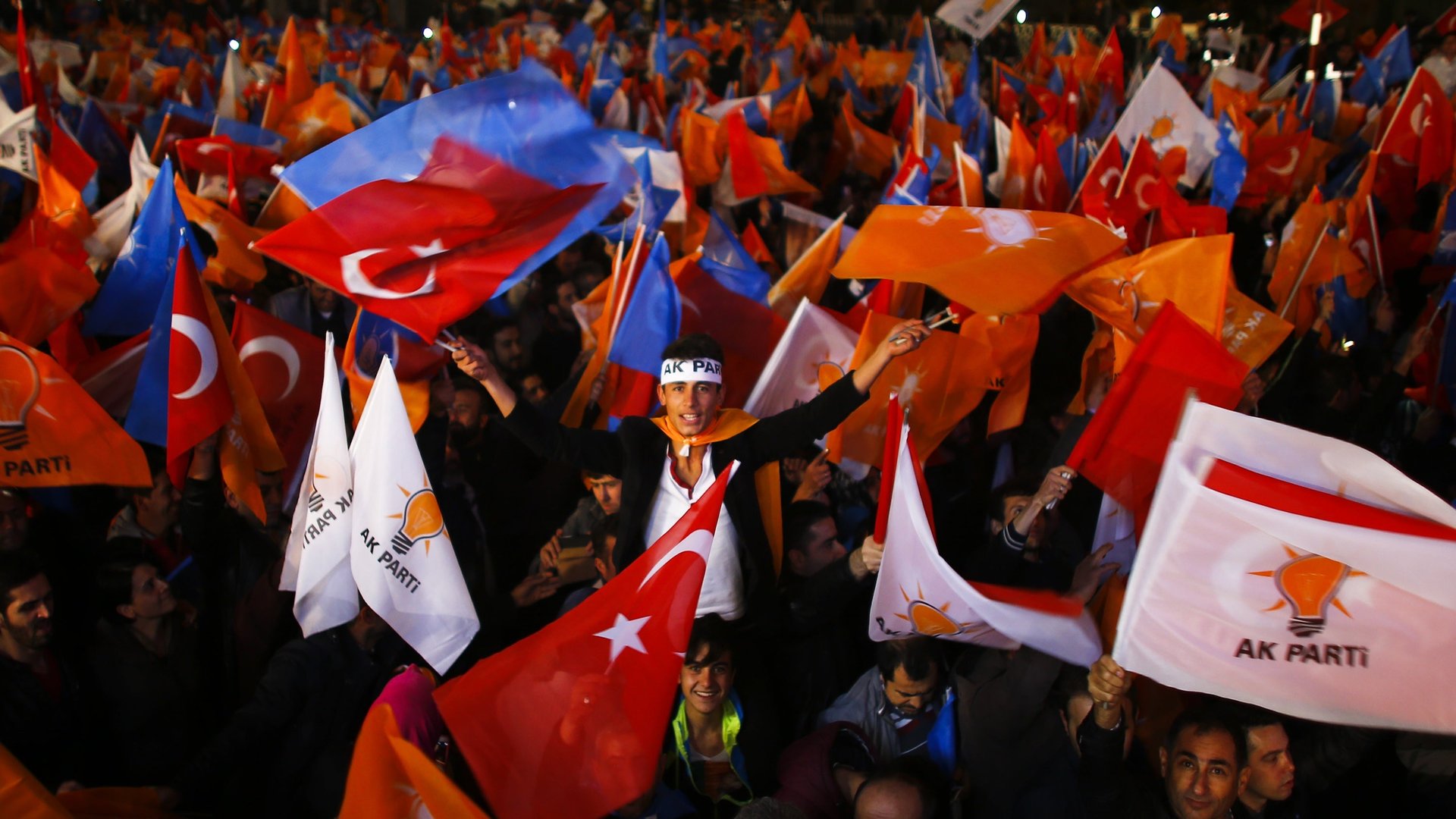Do Turks care about freedom?
Turkey’s strongman president, Recep Tayyip Erdoğan, is feeling pretty good right now—his favored Justice and Development party (AKP) won an unexpected landslide victory in national elections this Sunday, solidifying single-party rule in Ankara. The AKP took just under 50% of the votes—enough to control 316 of the 550 seats in parliament and form an independent government.


Turkey’s strongman president, Recep Tayyip Erdoğan, is feeling pretty good right now—his favored Justice and Development party (AKP) won an unexpected landslide victory in national elections this Sunday, solidifying single-party rule in Ankara. The AKP took just under 50% of the votes—enough to control 316 of the 550 seats in parliament and form an independent government.
Meanwhile, “Describing the results as a disaster, the main secularist CHP opposition saw its share of the vote slip to 25.4%, 134 seats, while support for the nationalist MHP party fell sharply to 12% or 41 seats, compared to 80 in June’s election,” according to The Guardian.
This is the second vote in five months for Turkey; following in the wake of a June poll in which the right-wing AKP failed to secure a majority for the first time since rising to power in 2002. This renders Sunday’s victory rather shocking to observers in and outside of Turkey.
Marked discrepancies with opinion polls taken earlier this year might lead some to suspect voter fraud. Indeed, rumors of the sort have been circulating in the run-up to election day.
“Opposition parties have been alarmed by claims that the results of the Sunday election could be manipulated,” reports Today’s Zaman, one of Turkey’s largest English-language dailies. A number of anonymous whistleblowers have taken to social media to decry ballot-box manipulation by ruling-government officials, as well as raise the specter of cyberattacks on digital polling equipment.
The country’s Supreme Election Board (YSK) has assured the public as to the security of its systems, but the Republican People’s Party (CHP), the Kurdish People’s Democratic Party (HDP), and the Nationalist Movement Party (MHP), which constitute the main opposition, have all installed hefty security programming on their own servers.
It’s also worth noting that thousands of civilian volunteers were mobilized after June polls to monitor Sunday’s elections. “We’ll only be satisfied when, the day after an election, no one is talking about vote-rigging and fraud,” Sercan Celebi, founder of Oy ve Ötesi, a major Turkish election-monitoring organization, told Deutche Welle.
Some attribute the AKP’s astounding victory to Erdoğan’s campaign tactics. “President Erdoğan has got his majority back, but Turkey has been damaged in the process. Its independent institutions have been undermined, its constitutional rules have been disregarded, the relations between ethnic Turks and Kurds have deteriorated, and it is back in a war it thought was over,” The Guardian’s editorial board writes. “It is typical of him that he has not for one moment since he assumed office as president acted as the ceremonial figure, standing above politics, the constitution lays down he should be. He will continue to seek the changes he wants, and if he does not get them, he will act as if they have already happened.”
Kenneth Roth, executive director of Human Rights Watch, attributes Erdoğan’s win to “crushing the basic principles of electoral democracy.”
“Critics say Mr. Erdogan’s divisive rhetoric, by denigrating opponents as terrorists or traitors, helped polarize the country,” note Tim Arango and Ceylan Yeginsu for The New York Times. “And a government crackdown on dissent in the lead-up to the vote, with mobs attacking newspaper offices and a recent raid on a media conglomerate opposed to the government, raised concerns abroad about Turkey’s commitment to democracy.”
Though it would be premature to rule out electoral manipulation of any kind, there does appear to be some numerical basis for the AKP’s stunning success—a nine-point increase from June’s poll.
It all comes down to the lira, according to Hürriyet Daily’s Emre Deliveli. “While president Recep Tayyip Erdoğan’s warmongering, the Kurdish terrorist group the Kurdistan Workers’ Party (PKK) and the Islamic State of Iraq and the Levant’s (ISIL) attacks and the Nationalist Movement Party (MHP) all played their part this time, the party’s economic management is usually given as one of the leading reasons for its recurring success,“ he claims. “In fact, growth hit bottom and unemployment peaked, exactly in March 2009.”
As of Monday, Nov. 2, the Turkish lira was up nearly 4% against the US dollar to 2.8, according to the BBC.
If independent observers are able to conclude that voter fraud played little to no role in Sunday’s elections, progressive Turks and the wider world may be forced to accept that a majority of voters simply value robust economics over the preservation of civil liberties. (The government brazenly shut down a major media outlet just two days before elections.)
“Turkey’s elections display that huge corruption, clampdown on the media, and lack of rule of law do not really matter to the majority,” says TZ columnist Sevgi Akarçeşme. “Sad truth.”
For Turkey, which has been an undeniable stabilizing force in a turbulent Middle East, and a country founded on strong, contemporary democratic history, it’s a sad truth indeed.